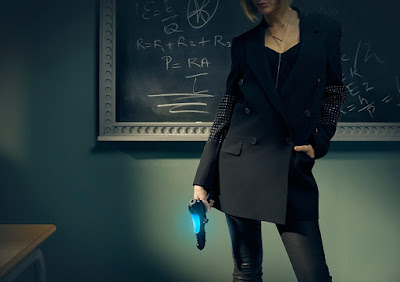Well, having gotten the opportunity to watch “The Metaphysical Engine, Or: What Quill Did,” I think I can agree with Phil Sandifer’s review of the episode. It’s quite the hot mess. A really cool hot mess with loads of crazy and fascinating sci-fi ideas.
The story is balls out, whack-daddy, batshit crazy. But kind of ridiculous. Just the kind of crazy that Doctor Who has been good at since the early days.
To the audience, Quill has a very deceptive demeanour. Kelly’s physicality appears very cold and distant in the initial promotional material. They shoot her like an ice queen, and her behaviour in the early episodes displays a cold, manipulative aggressiveness.
Rage peeks out from Quill’s stony physiognomy occasionally. As do all her passions. Her genocidal anger at the Shadowkin. The desperate eros of her kiss with the android in “The Coach With the Dragon Tattoo.” The giddy glee of driving a bus into a grotesque alien tentacle.
Patrick Ness cheekily subtitled this episode “What Quill Did.” It’s a joke, a counterpoint to the bottle episode of the under-25s cast* stuck in their classroom in a nameless void.
* Class is positively 90210 in casting adults as teenagers. Charlie’s Greg Austin is 24. Fady Elsayad is 23. Vivian Oparah is 19, but she plays a 14 year old. April’s Sophie Hopkins is 26 years old and plays someone who just turned 18.
She has to, because the episode is a ridiculous Maguffin chase. It succeeds only because its actors are totally dedicated to its madness.
More than just saving the episode from collapsing into a pile of disjunctive nonsense flying away in all directions, Kelly’s charisma as Quill effects a very important transformation in how the audience sees the show.
Heroes and Villains
I’ve come back several times to the moment in the first episode of Class, “For Tonight We Might Die,” where the Doctor admonishes Quill for a crime. She defends herself as a freedom fighter, because she’s long become accustomed to people calling her a criminal because of her guerrilla campaign against Rhodia’s monarchy.
But the Doctor’s upset with her because of how she tricked a Coal Hill student into killing himself firing Quill’s self-sacrificing Rhodian gun at a Shadowkin. The point of the moment is that Quill is not the self-evidently obvious villain that Charlie’s described her as.
The Doctor is the ethical compass of Doctor Who’s universe, and if he sympathizes with you, it’s a sign that you’re in the right. At least in part.
Because the under-25s are absent from this episode, we can let ourselves sit with Quill without interruption. She’s in every scene of “The Metaphysical Engine,” carrying the story almost entirely on her own.
This has never happened during the entire run of Class so far. She’s essentially locked the under-25s away where their ensemble can self-destruct and she’s taken over the show.
More than that, she deserves to take over the show by the time “The Metaphysical Engine” finishes. Though it constitutes
SPOILERS
to say so, this episode is her emancipation story. We’ve been shown how much Quill is willing to risk for her freedom from the biological weapon in her brain, enslaving her to Charlie.
The show has challenged Charlie on his treatment of Quill before, most obviously in “Co-Owner of a Lonely Heart.” So we’ve been primed to a more sympathetic view of Quill than the show first gave us when she was Charlie’s ice queen bodyguard and the most psychotic physics teacher you’ve ever had.
So if Quill has become a hero, Charlie would become even more villainous in contrast. It completes the journey from his squeaky clean appearance at the start of the series, through his critiques from Tanya and Matteusz, through his immense guilt and rage in “Detained.”
More than that narrative role, it shows more profoundly than Class has ever done yet what the nature of heroism is.
Right and Wrong
Because when you think about it, Quill has always been in a subject position. Consider the fact that Charlie – her literal master – always calls her by her surname. A surname that’s also the name for her people. It would be like calling someone “Black” or “China” as their name.
Considering that Andr’ath’s rebellion was the uprising of an oppressed class on Rhodia, there’s probably plenty of racism in Charlie’s condescension toward her. So while Charlie’s been positioned as the hero from the early press materials through the show’s first episodes, Quill is the most sympathetic figure according to all our political moralities.
She is a freedom fighter, and “The Metaphysical Engine” was her most intense fight for freedom yet. As an agent of liberation from racism, monarchy, and slavery, there’s no more pure representative of the good and of freedom than her.
Charlie has entered the role of oppressor, and Quill depicted completely as a freedom fighter.




No comments:
Post a Comment